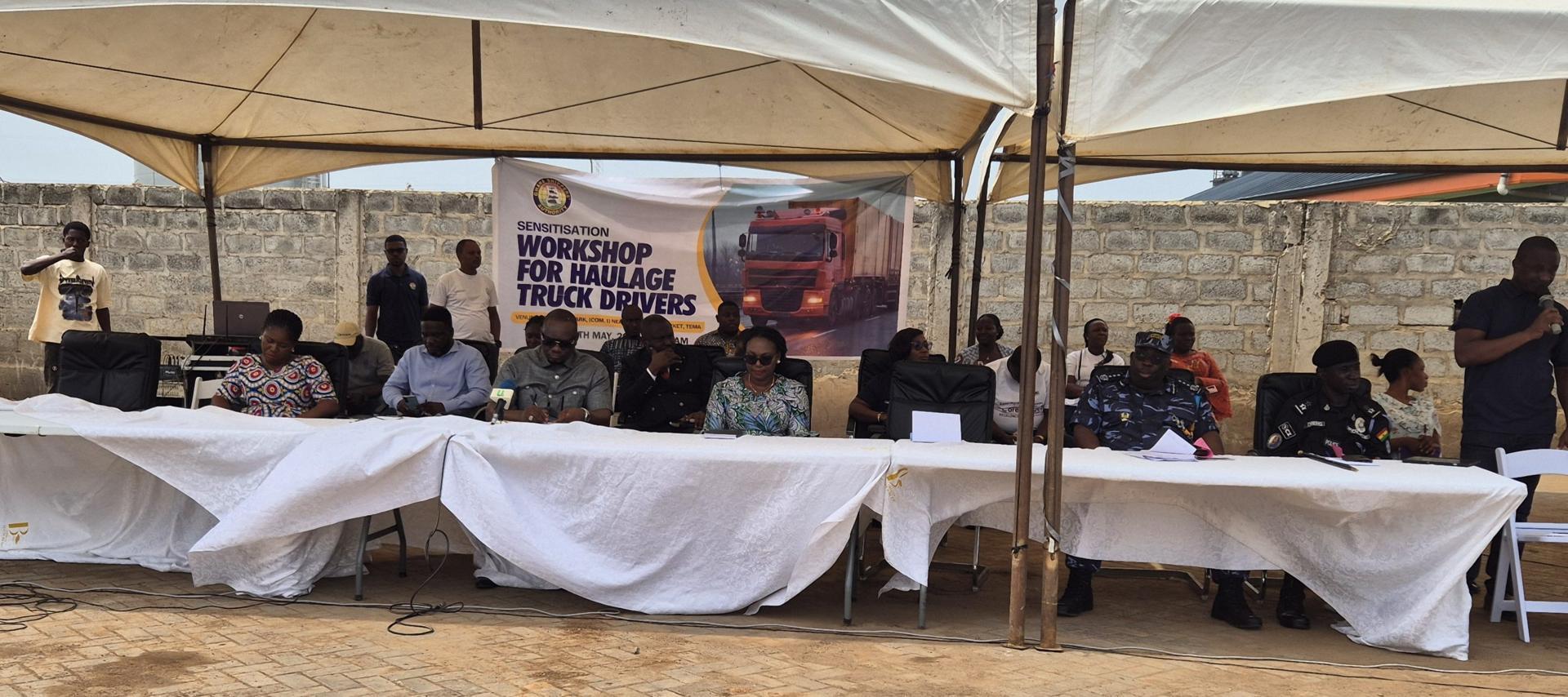Africa-Press – Ghana. The Ghana Shippers Authority (GSA) has organised a sensitisation workshop for haulage truck drivers in Tema on critical issues affecting Ghana’s transit corridors to improve compliance with applicable regulations.
The workshop was attended by truck drivers from Burkina Faso, Mali, and Niger, executives of the Ghana Road Transport Union (GPRTU); the Joint Association of Port Transport Union (JAPTU); and other stakeholders.
Professor Ransford Gyampo, the Chief Executive Officer (CEO) of the GSA, in a speech read on his behalf by Mr. Prince Henry Ankrah, the deputy CEO in charge of operations, said the workshop was organised in line with the Ghana Shippers’ Authority Act, 2024 (Act 1122).
Professor Gyampo noted that transit trade is estimated to contribute over US$34 million annually to Ghana’s economy from services associated with the handling and movement of transit cargo, payments to haulage truck operators, freight forwarders, electronic tracking operators, and fuel stations.
He added that these benefits notwithstanding, Ghana’s transit trade was beset with a myriad of challenges that threaten to erode the gains made over time and therefore called for collaboration between stakeholders.
He indicated that Ghana, being a preferred corridor in the sub-region for transit operators, has reported issues such as high charges by service providers, incessant port delays, high haulage costs, numerous checkpoints, deplorable road conditions, lack of rest stops, and other non-tariff barriers.
Prof Gyampo said: “Distinguished participants, the solutions to the above challenges require nothing less than the collective effort of all stakeholders in the transit trade ecosystem.
“The government, on its part, has enacted the facilitation of transit trade in the Ghana Shippers Authority Act, 2024 (Act 1122) to strengthen the Authority in streamlining processes of service providers and stakeholders for the benefit of all players in the industry. Additionally, Act 1122 empowers the Authority to approve charges and shipment conditions of shipping service providers and to ensure compliance.”
The GSA CEO expressed confidence that this legal framework would further contribute to improving service standards and reducing the cost of doing business at Ghana’s ports.
He indicated that as the organisation mandated to regulate the commercial activities of shippers and shipping service providers in the shipment, storage and delivery of international trade cargo, the GSA has, over the years, actively collaborated with stakeholders in the trade and transport industry to find solutions to the challenges that impede progress of commercial shipping in Ghana.
He commended stakeholders including the Ghana Ports and Harbours Authority (GPHA), Ghana Revenue Authority Customs Division, the Ghana Police Service, SIC PLC, the Transit Shippers Councils of Burkina Faso, Niger, Mali, Ghana Highways Authority, and the various transport unions for their diverse contributions towards an improved transit corridor.
Professor Gyampo indicated that as key stakeholders to achieving the cardinal aspirations of the African Continental Free Trade Area (AfCFTA) in boosting intra-African trade, his outfit believes that such capacity-building exercises position Ghana to maximise its benefits.
He said: “Distinguished participants, the strategic importance of truck drivers/haulers in the haulage of transit cargo across our borders cannot be overemphasised, especially given the absence of rail services in Ghana.
The Ghana Shippers` Authority, in its commitment to facilitate transit trade, has spared no effort in ensuring that haulers of international trade cargo are regularly sensitised on international conventions, national/regional regulations, directives and measures that relate directly to their operations to promote compliance and the safety of the drivers, the trucks and other road users.”
Resource persons from the Environmental Protection Agency (EPA), the Ghana Highways Authority, and the GSA took participants through the transportation of dangerous goods, registration of hauliers of international trade cargo, and the ECOWAS-UEMOA Harmonized Act on Axle Load Control in West Africa, respectively.
The transit drivers also aired their concerns, including the deplorable road networks in Ghana, unauthorised charges, and robbery attacks, among others they faced as they carried cargo from Ghana to the landlocked countries.
For More News And Analysis About Ghana Follow Africa-Press







